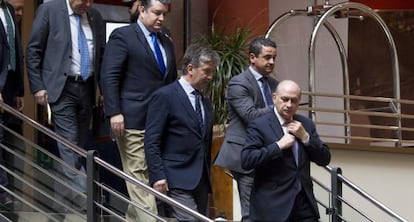Rajoy seeks wide-reaching political consensus over war in Syria
Attempt is turning point for Spanish politics, more accustomed to a go-it-alone approach

Prime Minister Mariano Rajoy is negotiating with opposition leaders in a bid to develop a coordinated national response to jihadist terrorism.
Rajoy, of the conservative Popular Party (PP), had already signed a similar agreement in February with the head of the Socialist Party (PSOE), Pedro Sánchez, following the terrorist attacks against the French weekly Charlie Hebdo.
But now the Spanish leader is also trying to secure support from Ciudadanos and Podemos, two emerging parties that stand to attract a significant amount of votes at the general election of December 20.
This attempt at broad consensus-building signals a turning point in Spanish politics
Rajoy has spoken with party heads Albert Rivera and Pablo Iglesias, as well as with Iñigo Urkullu, of the Basque Nationalist Party (PNV). Meanwhile, Deputy Prime Minister Soraya Sáenz de Santamaría is approaching other parties with congressional representation to seek their backing.
This attempt at broad consensus-building, which follows a similar initiative aimed at dealing with the Catalan separatist challenge, signals a turning point in Spanish politics, where disunity and go-it-alone policies have been the norm since the democratic transition in the late 1970s.
Spain remains on a level 4 alert for terrorist threat, and has arrested more jihadists than any other European country this year. In its online propaganda, the Islamic State has named Spain a target, recalling the country’s Muslim past as Al-Andalus in medieval times.
Fresh from his trip to Antalya (Turkey) to participate in a G-20 summit, Rajoy recalled the domestic problems derived from the unilateral behavior displayed by former Prime Minister José María Aznar (also of the PP) following the Madrid train bombings of March 11, 2004, and his decision to support George W. Bush’s war against Iraq in 2003.
While Rajoy is not expecting full agreement on what to do in Syria – not even Russia, France, the United States and Britain were able to build a strong alliance at the summit – he does want “a coordinated, common political response on the essential issues.”
But the government and all the main parties agree that before greenlighting any Spanish military action against ISIS, a United Nations resolution and a congressional mandate will be required.
And for now, nobody is expecting to see Spanish party leaders gathering at La Moncloa for a debate and a group photograph – at least, not at any time before December 20, a date that could see the end of the two-party dominance by the PP and PSOE.
English version by Susana Urra.
Tu suscripción se está usando en otro dispositivo
¿Quieres añadir otro usuario a tu suscripción?
Si continúas leyendo en este dispositivo, no se podrá leer en el otro.
FlechaTu suscripción se está usando en otro dispositivo y solo puedes acceder a EL PAÍS desde un dispositivo a la vez.
Si quieres compartir tu cuenta, cambia tu suscripción a la modalidad Premium, así podrás añadir otro usuario. Cada uno accederá con su propia cuenta de email, lo que os permitirá personalizar vuestra experiencia en EL PAÍS.
¿Tienes una suscripción de empresa? Accede aquí para contratar más cuentas.
En el caso de no saber quién está usando tu cuenta, te recomendamos cambiar tu contraseña aquí.
Si decides continuar compartiendo tu cuenta, este mensaje se mostrará en tu dispositivo y en el de la otra persona que está usando tu cuenta de forma indefinida, afectando a tu experiencia de lectura. Puedes consultar aquí los términos y condiciones de la suscripción digital.








































